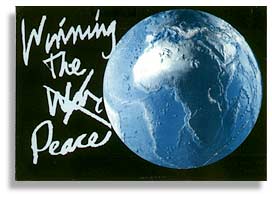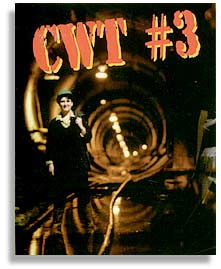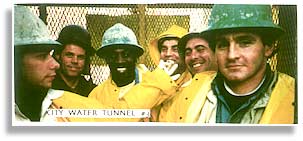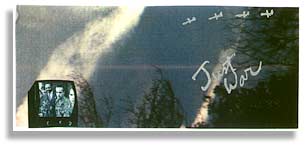|
Maverick Artist Conversations with Theater Artist, Marty Pottenger by Eloise de Leon
"Winning the Peace" was a formal performance edited from about 400 pages of e-mail and interviews she collected from Kosovar Albanians terrorized as their villages and homes were being destroyed, e-mail from Serbians about the experience of being bombed by NATO, and reports by journalists covering the Kosovo war. Pottenger wanted to wake up her New York friends and neighbors to the fact that their community boundaries had been exploded by war. Pottenger explained, "People were so confused by the bombing. My conversations with people revealed isolation, fear and confusion, partially the result of reading newspapers alone, watching television news reports alone as well as the horrific and occasionally contradictory images and stories that were being reported." To perform the text, Pottenger gathered 35 friends and family from her New York community, including a rabbi, a minister, a former Vietnam bomber pilot, electricians, union presidents, choreographers, AIDS workers, and even her carpentry clients. Caron Atlas, former director of the American Festival Project, and performer in "Winning the Peace," recounts the experience: "We met one another at the rehearsal and talked about why it was important for each of us to respond to what was happening in the former Yugoslavia. It was important for Marty that we listened to voices from Kosovo and Belgrade and to our own voices, in all of their multiplicity." My conversation with Pottenger about her work continued through months of e-mails and phone calls, during which I learned about the trajectory of her work and the motivations and intentions of the maverick artist. Pottenger's work as a contemporary theater artist involves establishing a space to bring people's voices together. The ambivalence of individual voices are transformed into a collective willingness to 'not know' everything even in the face of making serious decisions. Pottenger asks for a re-negotiation of one's position from fixed to fluid, through the telling of and the listening to stories. Her project is based on the possibility of reconciling community faced with the treacheries of past histories. Asked to define her community, Pottenger does so in broad strokes, "Well, there's the labor movement, that's a community, right? And there's New York, that's another community, right? And then there's the United States." Pottenger's reluctance to define specific community lines illustrates her drive to blur borders and create in its place a permeable 'imagined community', allowing her to work anywhere she feels drawn. The manifestations of Pottenger's politics are her performances, often done in, with, and for specific communities. One such show is "City Water Tunnel #3" which earned her an Obie Theater award in 1996. The performance chronicled the development of the $5 billion water tunnel project, the largest non-defense public works project in the Western hemisphere. Pottenger spent months shadowing and interviewing the community of tunnel builders, crafting a narrative thread through the complexity of information. In "City Water Tunnel #3," Pottenger, stands on a darkened stage engaging in friendly conversation with the audience. She moves in and out of narration to perform characterizations of various people that work on the tunnel. On stage are tunnel artifacts and a video screen which intermittently displays the inside workings of the tunnel. Pottenger as narrator is folksy and friendly, conjuring up images of water, Galileo's tears, water pouring into her instant coffee, rain and sweat pouring down (rock singer) Melissa Etheridge's face during an outdoor concert. Her musings slowly unfold into a story, a story about the New York water tunnel system, pathways where water and people and stories all converge. By the end of the performance one is given to the grand realization of the complexity of those relationships, and therein lies her craft. Pottenger takes you to the "ahhh" of life which she locates in the sheer intelligence within nature and humankind. Marty described the response of one builder to her performance: "After he saw a performance, a geologist handed me a core boring which was 450 million years old, from a time when New York City, the Orkney Islands, and the west coast of Africa, were all part of the same land mass. We were at one of the construction sites and he handed it to me kind of secretly and said, 'Thanks for showing them who we really are." Pottenger's early childhood shaped her need to speak out. She was still in diapers when her antics transformed her mother's bad mood into laughter. Pottenger remembers it as a powerful moment. She had many more bad moods and family arguments to contend with over the years. "My people were right-wing Republicans so I had to, right away, speak to people I stood in opposition to. Very passionate opinions were expressed. I learned at least to not end the conversation." She began performing almost out of necessity: "I saw how laughter brought out a kind of humanness." By age 6 she was putting on neighborhood shows with her friends for 5 cents admission. In high school she acted, and directed children's theater.
By the early 1970's Pottenger was living happily outside the mainstream as lesbian, carpenter, and artist. She joined the women's movement which sparked the emergence of a new kind of performance work for her. Excited by the issues, Pottenger responded with improvisational performances at gatherings, conferences and speak-outs. "It just occurred to me that this was what needed to happen. Theater was the only place that I had experienced possibilities for contradictory passions that even began to match what we needed as a movement." Pottenger's power was to create theater as a dialectical space where audiences could move from a space of political resistance into the imagination of new possibilities. Pottenger continued to successfully integrate her political activism with her performance work. In 1975, Pottenger co-founded "Heresies: A Feminist Publication on Art and Politics." At one of their early retreats, she opened the meeting by cutting her hair while maintaining eye contact with collective members. She managed to scare people and it was that edge that marked Pottenger's political performance work. Two years later during a speak-out for sex-workers in New York, Pottenger and a sex-industry worker, sat across from each other, took off their shirts and performed mouth-to-mouth resuscitation without stopping until they were too dizzy to continue. "It was this small space, maybe there were a hundred women. It was the first public speak-out on prostitution and so a lot of sex industry workers were there." The performance mirrored Pottenger 's perception of the growing infighting and backlash in the women's movement, "We were getting more closed, more closed, more closed...we were losing good air...and we were gonna die, we can't survive like that." Pottenger's working class identity shapes much of her work. Her celebratory performance at the First National Tradeswoman Conference, "House Building Time," was a 15-minute choreographed construction of a small house, complete with roof, walls, windows, door, overhead light and water plumbing. Orchestrated to a recording of the "Mad Scene" sung by Maria Callas, Pottenger directed a team of women house builders wearing yellow slickers. Performed in real time, the builders bantered as they worked, and even Pottenger confesses she wasn't certain what they could accomplish. It was nothing short of a miracle when the electrician leaned inside to pull the lightbulb chain shedding light on the completed house as the aria came to a close. Then, suddenly, during a show at the New York theater, Medusa's Revenge, Pottenger had a powerful realization of herself as a performer. She witnessed herself revealing more than she had consciously realized before, igniting a vulnerability that so shocked her, she stopped performing for 10 years.
Pottenger soon hungered for a performance community where she could further cultivate her work and have the relationships in theater that she had known from her trades activism and social change work. "I started my search for other working class people, other people who were making political work, other people who saw work in that context. And Joe Lambert was one of the first people I met that was a kindred spirit. He came from the same kind of political movements that I had come from. And it meant so much to me because I was getting very lonely." Pottenger spent four months as an informal artist in residence at "Life on the Water," a San Francisco contemporary performance space. The residency actually consisted of her sleeping on a bed in the office and as she puts it, 'talking, talking, talking with Joe'. Joe Lambert was a trained community organizer and for years had been active in public policy campaigns for social justice. Shifting from politics to performance, he became director of the People's Theater Coalition until 1986 when he co-founded Life On The Water (Lambert is currently the co-director of the Center for Digital Storytelling in California). Remembering Pottenger fondly, Lambert said, "Her framework is political. She understands oppression. But her voice is a transcendent voice that expands the rhetorics of resistance politics...a place where anger and forgiveness, reason and redemption swirl around in pools." One of the more subtle but profound influences in Pottenger 's work is Re-Evaluation Co-Counseling. 'RC,' as it is commonly called, is a peer-counseling technique based on the theory that everyone is inherently intelligent and 'doing their best' although it may be distorted by cloudy thinking from early painful experiences and societal oppressions. The basic remedy, RC'ers suggest, is to provide focused, attentive listening which help the speaker 'discharge' painful memories and shift into clearer thinking. "In counseling I found what I had intuitively understood, that the act of listening is a tremendously powerful exchange that humans get to do with each other," Pottenger said. "It's become a part of how I've been making art for 13 years." Steeped in this practice, Pottenger is the consummate listener, a skill that serves as her tool for building relationships in her personal life as well as for shaping characters in her theater pieces. As an artist, Pottenger thus shapes her work from a palette of counseling theory, theater training, and the intact feminist undertow from her early involvement in the women's movement. In the late 1990's Pottenger's attention turned towards the wars in the Balkans. She felt compelled to respond with her "full being", as an artist. "When NATO started bombing...it hit me that it wasn't their war anymore, but my war. I grew up with Vietnam being a critical experience. I'd watched Grenada, I'd watched Panama, I'd watched the Gulf War, I'd watched war after war happen without any direct response on my part...I needed to understand it much more than I did, and art was my language." Pottenger joined forces with Dubravka Knezevic, a kindred artist and former professor of Dramaturgy from Belgrade. Knezevic was a former Radio TV Serbia staff member. She had published the only peace magazine in the 1990s and was a founding member of many opposition initiatives involving culture and media. Now living in the United States, Knezevic arranged for Pottenger to meet Ana Milijanic, co-director of the Centre for Cultural Decontamination in Belgrade. Milijanic has worked relentlessly since the Centre's opening in January 1995, directing numerous plays while increasing her political activism. The Centre for Cultural Decontamination is one of the few remaining cultural organizations in Serbia that stood in open opposition to the Milosevic regime. Pottenger also met the Centre's director, Borka Pavicevic, who produces the Centre's exhibits, theater performances and happenings with great speed, in contrast to the year or multi-years of planning which most U.S. companies require. During a conversation a couple of years earlier, Pavicevic explained that Yugoslavia had experienced such a phenomenal upheaval since 1990, that left society with no plan of how to live, "The time is changed, the space is changed. It seems that my life before the war was the life of another person and at the beginning of the war I became another person. It's a time of great violence. Before the war you thought that the personal life is something that is crucial, that the life of your parents is important and that when your parents die it will be something terrible. When you see collective death...that is a completely different question, even for the theater. We have no time, we have no space. It's very complicated." Pottenger arrived in Belgrade with her script of "Winning the Peace" in hand, two weeks after the NATO bombing had ceased. The script was key to her being accepted and soon Pottenger and Milijanic were considering a collaboration. In addition to further introductions arranged by Milijanic, she traveled throughout the former Yugoslavia, meeting people on buses, trains and streets. Pottenger met and interviewed soldiers from the KLA, Bosnian Muslim, Croatian, and Yugoslavian armies and various paramilitary forces as well as citizens, shopkeepers and political activists. In her work with the women's movement, Pottenger had led men's groups for pepetrators of violence against women. Seeing the parallels, she wondered at how the soldiers would re-integrate into social life, "I know...the way that stuff gets internalized and is directed at families and communities."
"(Karadzic's niece) said that the Serb men would never rape. She went on for 40 minutes saying it was out of the question..." The niece's attitude towards Albanians reminded Pottenger of her own family's heritage of Southern, white, working class racism. "I pointed out to her, by denying so passionately what she must know to be a lie, that Serbian men did not rape, she's condemning her brothers and her uncles and her fathers and her sons to silence, that one effect of what she's saying, is not defending Serbian men but actually condemning them to silence. Condemning them to beat their wives and feel horrible about themselves and drink themselves to death. And basically what she's saying to them is, I don't want to know what happened to you. I don't want to know. Do not tell me. As I stopped talking, she started crying silently. We were quiet for a while and then she'd pick up another topic. One was 'Serbian men don't rape, Albanians are...Kosovo is ours and we will get it back if it takes 500 years...', you know, all that stuff." Pottenger returned to the U.S. from her travels feeling confused. "I returned filled with pain, respect, despair and contradictions. I spent time with individuals who had stood by during atrocities, human rights activists, soldiers who had committed war crimes, trade unionists, smugglers, a father who had defended his town at the cost of his son's life, parents who now raise their families in homes that belong to others. The difference between soldiers who had stepped over some line and soldiers who hadn't, was completely evident in their eyes."
Even as Pottenger continues writing "Just War", she begins work on a new project called "Abundance" for which she will interview rich and poor Americans throughout the nation. Pottenger's work is all about relationships. It's about people and how they/she/we relate to one another and how relationships do or don't support our intentions or even life itself. It's about community on local and global levels. Pottenger's project is not to prescribe answers, but rather to move audiences to think and discuss and laugh and cry--together. But it is still up to each individual audience member to decide how to take action. About the writer: Eloise de Leon is an artist coach, writer and filmmaker currently living in New York. Her articles may be found in the Art Changes and Human Rights / Civil Rights sections of In Motion Magazine. Her website is: www.insightandjoy.com and her email is: eloisemargaret@gmail.com. Published in In Motion Magazine Summer, 2001. Artists' Palettes. This article by Eloise de Leon is part of a series of interviews with contemporary artists investigating the range of elements they use to create quality art for social change.
|
|||||||||||||||||||||||||||||||||||||||||||||||||||||||||||||||||||||||||||||||||||||||||||||||
If you have any thoughts on this or would like to contribute to an ongoing discussion in the  What is New? || Affirmative Action || Art Changes || Autonomy: Chiapas - California || Community Images || Education Rights || E-mail, Opinions and Discussion || En español || Essays from Ireland || Global Eyes || Healthcare || Human Rights/Civil Rights || Piri Thomas || Photo of the Week || QA: Interviews || Region || Rural America || Search || Donate || To be notified of new articles || Survey || In Motion Magazine's Store || In Motion Magazine Staff || In Unity Book of Photos || Links Around The World || OneWorld / US || NPC Productions Copyright © 1995-2014 NPC Productions as a compilation. All Rights Reserved. |
|||||||||||||||||||||||||||||||||||||||||||||||||||||||||||||||||||||||||||||||||||||||||||||||






